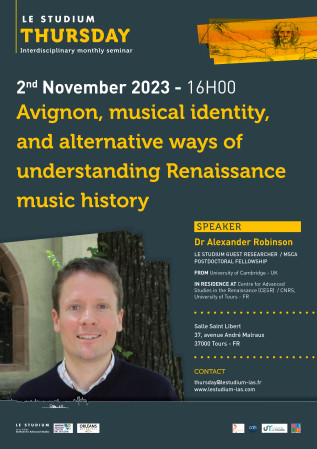Avignon, musical identity, and alternative ways of understanding Renaissance music history
Salle Saint Libert
37, avenue André Malraux
37000 Tours
France
Presentation
What was the music that was performed, heard and experienced by people living in France during the sixteenth and early seventeenth centuries? Standard histories devoted to this topic tend to gravitate towards the most important composers and the forms of music which they helped to develop: in other words, figures like Josquin des Prés (d.1521) and Roland de Lassus (1532–94), and genres like masses, motets and chansons. This has had two effects: firstly, it has resulted in a disproportionate focus on the highest forms of ‘art music’; and secondly, it has created a magnetism towards studying the royal court, the capital, and certain key centres (like Lyon, which was an important location for music printing at this time).
In order to provide a better understanding of the day-to-day reality of how music was actually experienced by French cities and their inhabitants during this period, this two-year project takes Avignon as its case study. Like many other cities in France during the Renaissance era, Avignon’s musical history remains largely unexplored. On the one hand, this is due to the lack of great composers or major musical developments associated with this region in the sixteenth and early seventeenth centuries; but in part, it can also be attributed to the state of the sources, many of which are either lost or difficult to penetrate. Analysis of what does survive nevertheless reveals that music played a crucial role in many aspects of daily life, as well as in political and ceremonial events (like the solemn entries which were organised to welcome an important royal or political figure). Moreover, study of the music in Renaissance Avignon also raises questions of identity, particularly given the city’s status as a Papal enclave. Did the people of Avignon consider themselves to be French, ‘avignonnais’, or something in between? How did their music reflect this, and how does the answer to this question alter our appreciation of so-called ‘French Renaissance music’? Among others, these are some of the issues which this talk will seek to explore.
Speaker
LE STUDIUM Guest Researcher / MSCA PostDoctoral Fellowship
FROM: University of Cambridge - UK
IN RESIDENCE AT: Centre for Advanced Studies in the Renaissance (CESR) / CNRS, University of Tours - FR








